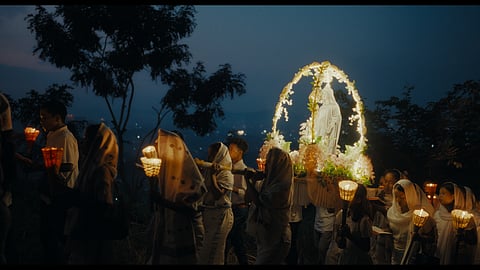Meghalaya filmmaker Dominic Sangma on his film ‘Rapture’
As a graduate of the prestigious Satyajit Ray Film and Television Institute, Dominic Sangma's journey from the hills of Meghalaya to the global stage has been nothing short of remarkable. His latest film, Rapture (2023) (Rimdogittanga-Garo), the second instalment in a trilogy exploring the memories and fears of a village community, and inspired by his childhood experiences, has earned widespread acclaim, including the Best Director Critics Choice Award at the Indian Film Festival of Melbourne (IFFM) 2024. Rapture also won the Best Cinematography award at the Malaysia International Film Festival 2024, and the NETPAC Award at MAMI 2024. Here’s Sangma in an engaging interview with us.
Your latest film Rapture has garnered international attention. Can you walk us through the journey of this film?
Rapture is the second film in a trilogy that draws heavily from the memories and experiences of my village in Meghalaya. The first film was MA.AMA, and this trilogy is deeply personal for me. It's almost like a form of release, a way to let go of the emotions and memories that have been part of my subconscious for years. The story is set in a village nestled in the Garo Hills, and revolves around the community's fear due to the disappearance of local people and the terrifying rumours of kidnappers involved in organ trafficking.
Rapture, which also premiered at the Locarno Film Festival, weaves a compelling narrative around a 10-year-old boy grappling with night blindness. In his world, every night becomes a haunting ordeal as the village succumbs to the fear of child-kidnappers. It delves into the deep cultural and spiritual realms of the Garo community. Despite the film's deeply rooted setting, it has showcased the ability to transcend local narratives and touch upon universal themes that have resonated with audiences far beyond the borders of Northeast India.
Your process of fictionalizing these memories seems intricate. How do you navigate this creative journey from memory to screen?
It's indeed a complex process. I started writing in 2018, and from there, it was a constant cycle of writing and rewriting. I attended project labs and received support from platforms like NFDC (National Film Development Corporation of India) and the Hubert Bals Fund from the Netherlands. These platforms, and attending several project labs, even in Cannes, were crucial in shaping the script. The main challenge was to bring the memories from my subconscious to the screen in a way that resonates with the audience.
Independent art house filmmakers in India often face significant challenges. Your thoughts on this?
Rapture was released in 152 theaters in France, which is unprecedented for an independent Indian film. However, in India, it's a different story. OTT platforms aren't buying these films, and theatrical releases are rare. Despite the global recognition that independent films like those by Rima Das or Payal Kapadia receive, we struggle to find platforms in our own country. There should be a mechanism, similar to France, where a portion of the earnings from commercial films is used to support independent art house films.
If you weren't a filmmaker, what you'd be doing?
(Laughs) I've always loved writing and music. At one point, I wanted to be a musician and form a band. But everything I love, from music to philosophy to farming, somehow finds its way into filmmaking.
What wouldn't you do as a filmmaker?
I would never approach a film with the intention of winning awards. That's not why I tell stories. The stories I tell are the ones that keep me restless until I let them out. I don't chase grand, marketable stories. I chase sincerity. I want to make films which are very rooted and true to the space, sincere in my writing because I want audience to understand the nuances without having to set the narrative or tone; It's great to know how the world perceives stories; Hence I try not to set the narrative but I take back the narrative from my audience.
Who are some of your inspirations?
I'm inspired by many, but in particular, the late Dewan Singh Rongmuthu, a writer from the Garo Hills who captured the essence of the Garo culture and philosophy in his work. Then there's Andrei Tarkovsky, the Russian filmmaker whose work I deeply admire.
Your advice to aspiring filmmakers?
Live life fully. Experience it in every way possible. The danger today is the over-reliance on technology—phones, social media, AI. These things disconnect us from the real world, from real experiences. To tell stories that matter, you need to have lived those stories in some way. Surround yourself with people who believe in you, read good books, watch good films, and stay open to the world around you.
This article is written by Shweta Raj Kanwar.

